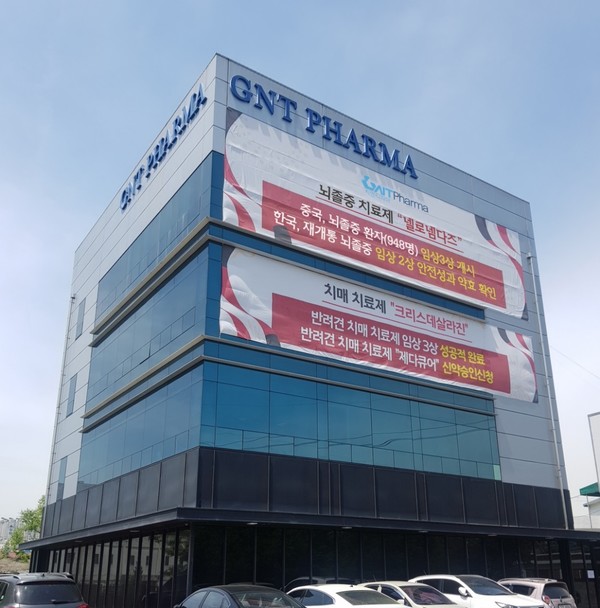GNT Pharma said Tuesday that it has received approval from the Ministry of Food and Drug Safety for a phase 3 clinical trial study of Nelonemdaz, a stroke treatment candidate.

"This is the first time that the government has approved phase 3 clinical trial for a locally developed stroke drug," the company said. "It is also the world's second phase 3 clinical trial of a brain nerve cell protection drug for stroke patients undergoing thrombus removal surgery, following a phase 3 clinical trial from NoNO, a Canadian-based drug company."
In phase 3 clinical trial, the company plans to verify the effect of Nelonemdaz on improving disability and protecting brain cells in patients with acute ischemic stroke who underwent thrombus removal within 12 hours of onset.
GNT Pharma will conduct the trial at stroke centers in 23 university hospitals, including Asan Medical Center, on 496 patients diagnosed with moderate to severe ischemic stroke on computed tomography (CT) or magnetic resonance imaging (MRI) images at the beginning of their visit.
It confirmed the safety of Nelonemdaz in phase 1 clinical trials, completed in the U.S. and China with 165 normal people, and phase 2 clinical trials on 447 stroke patients in Korea and China.
In the second phase of a local clinical trial conducted on 209 stroke patients who underwent thrombus removal surgery within eight hours, the company verified that Nelonemdaz significantly improved disability improvement effect compared to placebo in the three major evaluation scales of stroke efficacy.
Also, the company found no serious side effects, such as inducing psychiatric symptoms, pointed out as a problem with existing N-methyl-D-aspartate (NMDA) receptor inhibitors in stroke patients and normal people who received the treatment.
"Since the 1990s, global pharmaceutical companies such as Merck and AstraZeneca have developed neuroprotective drugs to reduce death and disability after stroke, but all of them failed in clinical trials," GNT Pharma CEO Kwak Byung-joo said. "Unlike the ischemia-reperfusion animal model in which the companies managed to prove drug efficacy, the absence of reperfusion stroke patients in clinical trials was the main cause."
However, the introduction of thrombus removal surgery in 2015 made clinical trials possible for patients with ischemia-reperfusion stroke, he added.
Kwak stressed that the goal is to launch a stroke treatment by 2025 by completing the approved phase 3 clinical trial together with top stroke clinical researchers.

